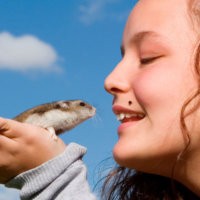Are you looking for a small pet that is cute and personable, but maybe a little bit exotic? A sugar glider may be a good choice. These little guys are really quite adorable, and make lovely pets. Read on as an Ellicott City, MD vet offers advice on sugar glider care.
Friends
Sugar gliders are very sociable, and really don’t do well by themselves. We recommend getting two or more, as a single glider will get very sad and depressed with no friends. Ideally, you’ll want to raise them together, so they bond while they are young. However, adult gliders can still bond.
Socializing
Sugar gliders can be timid, so your pet may need time to settle in and learn to trust you. One option is to put your little buddy in a small tent or pouch, and put that on your lap. Talking to them and offering treats will also help.
Cage
Sugar gliders love to climb, so their cages should be more high than wide. The cage should be at least 3 feet high and 2 feet wide, with horizontal bars that are spaced less than a half-inch apart. Your pet will also need some accessories, such as a hide box, climbing branches, nesting pouches, a water bottle, and toys. You’ll need to add substrate as well. Avoid pine or cedar substrates, as they actually are toxic to small animals.
Veterinary Care
Tiny pets need veterinary care too! Ask your vet to recommend an appointment schedule. Between appointments, watch for signs of illness, such as obesity, constipation, diarrhea, or lethargy. Your vet may also recommend neutering for male gliders.
Diet
Good nutrition is important for pets of all sizes, and sugar gliders are no exception. One thing to keep in mind before adopting sugar gliders is the fact that you may need to make your pet custom meals. These little guys eat fruits and veggies, which should be supplemented with vitamins and nutritional powder. You’ll also need to make sure your pet is getting enough calcium. For snacks, offer your pet fresh or dried fruit, yogurt drops, applesauce, apple juice mixed with water, or mealworms. Ask your vet for specific advice, including safe and unsafe foods, serving sizes, and feeding procedures.
Please contact us, your Ellicott City, MD vet clinic, with any questions about sugar glider care. We’re here to help!





